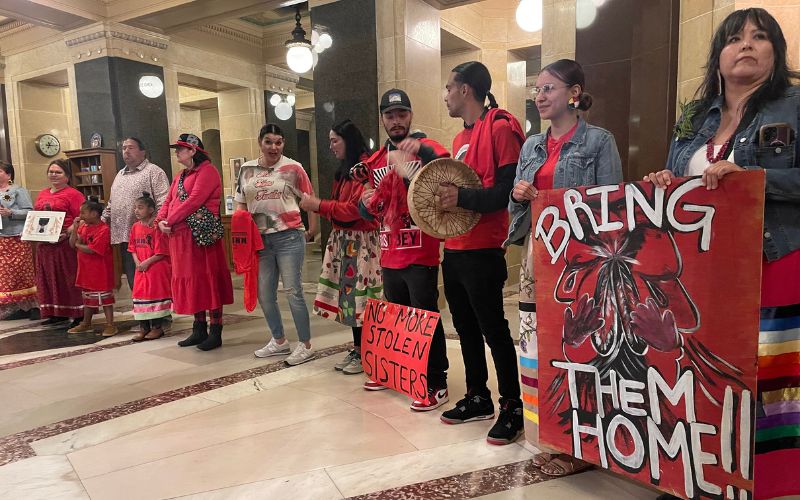
- Details
- By Kaili Berg
Against the backdrop of fluttering red dresses and signs bearing moving messages, families and survivors gathered at the capitol in Madison, Wisc., on May 7 for the third annual Murdered and Missing Indigenous Women and Girls (MMIWG) Day of Awareness.
The event — a collaborative effort involving the Waking Women Healing Institute, Gerald L. Ignace Indian Health Center, Wisconsin MMIW Task Force, Woodland Women, and Wisconsin Women’s Council — aimed to foster support and healing by raising awareness and sharing testimonies about the harsh realities faced by Indigenous people, particularly women and girls.
Dawn Wilber (Menominee) was among several women who stepped up to the microphone on the Capitol steps, recounting personal experiences with the MMIP crisis.
“I lost my daughter, and she hasn't ever received any justice,” Wilber said. “To a mother, the hole will never ever be repaired. It doesn’t matter how old you are, always make sure someone knows where you are at, where you are supposed to be, and when you are going to get there.”
As a group of young men drummed and sang, attendees formed a human chain, symbolically enveloping the capitol in red—a powerful visual representation of solidarity and remembrance.
“It feels really good that we are all here today,” Rachel Fernandez of Maeqtekuahkihkiw Metaemohsak Inc., Woodland Women and a member of Wisconsin’s Women’s Council, said at the event. “Let's take a moment to reflect on the purpose that brings us together. We're here to shine a light on the issues, to demand accountability from systems that have failed us, to both call in and call out the lack of response. We seek healing and justice for our families, those who are grappling with the loss of missing and murdered loved ones. While our hearts may ache with sorrow and pain, let's also find joy in the strength and purpose of our efforts."
Violence against Native women and girls remains a pervasive issue in Wisconsin and the U.S. According to the CDC, homicide ranks as the third leading cause of death for Native American girls and teens nationwide, with Native women being over three times more likely to be murdered than their white counterparts.
In addressing the crowd, Justine Rufus, co-chair of the Wisconsin MMIW Task Force, emphasized the urgent need for action regarding efforts to raise awareness and advocate for legislative support on key issues surrounding the MMIP movement.
"I'm deeply committed to taking action," Rufus said. "We've discussed the importance of creating reports across states. Now, we're actively rallying for awareness, shaking trees to capture attention. But talk can only go so far. It's time for concrete legislation."
Rufus highlighted that despite Wisconsin Governor Tony Ever’s 2023 proposed budget aimed at addressing the ongoing MMIP crisis in Wisconsin, the budget failed to pass Wisconsin’s Joint Finance Committee.
"We have an abundance of resources within the state, more than enough to address this issue. All we're asking for is an office dedicated to investigating and continuing the crucial work of the Task Force. We will persist in demanding it,” Rufus said.
More Stories Like This
Native News Weekly (August 25, 2024): D.C. BriefsUS Presidents in Their Own Words Concerning American Indians
Blackfeet Nation Calls Out McDonald’s After Native Athletes Turned Away
New Mexico Wild Action Fund Supports Deb Haaland’s Gubernatorial Bid
Landri Von Gonten Achieves Major Wrestling Recognition
Help us defend tribal sovereignty.
At Native News Online, our mission is rooted in telling the stories that strengthen sovereignty and uplift Indigenous voices — not just at year’s end, but every single day.
Because of your generosity last year, we were able to keep our reporters on the ground in tribal communities, at national gatherings and in the halls of Congress — covering the issues that matter most to Indian Country: sovereignty, culture, education, health and economic opportunity.
That support sustained us through a tough year in 2025. Now, as we look to the year ahead, we need your help right now to ensure warrior journalism remains strong — reporting that defends tribal sovereignty, amplifies Native truth, and holds power accountable.
 The stakes couldn't be higher. Your support keeps Native voices heard, Native stories told and Native sovereignty defended.
The stakes couldn't be higher. Your support keeps Native voices heard, Native stories told and Native sovereignty defended.
Stand with Warrior Journalism today.
Levi Rickert (Potawatomi), Editor & Publisher


